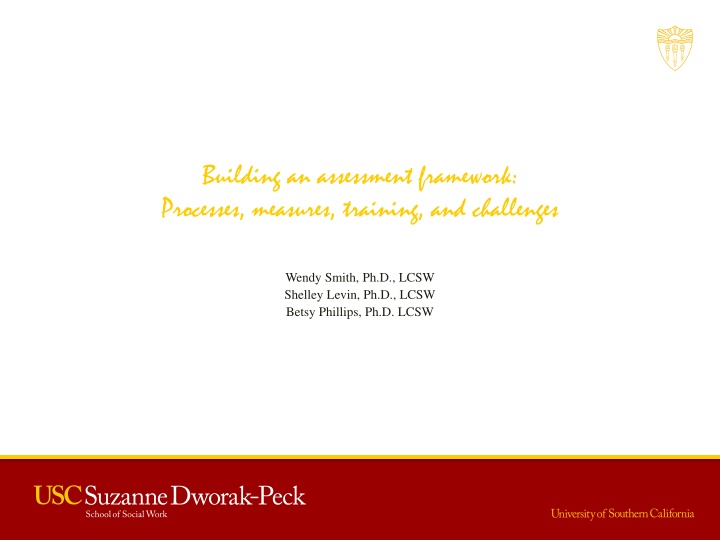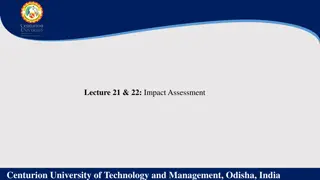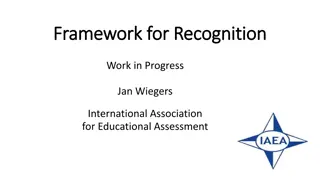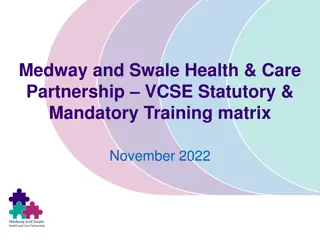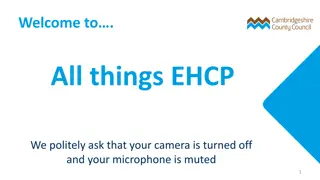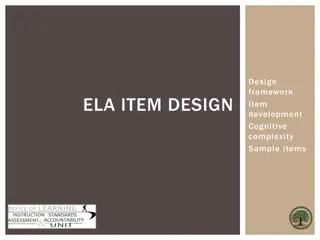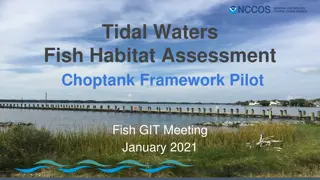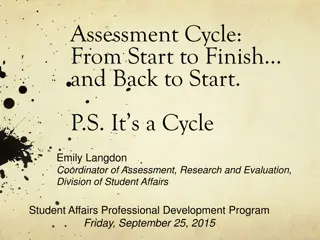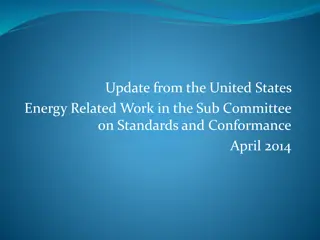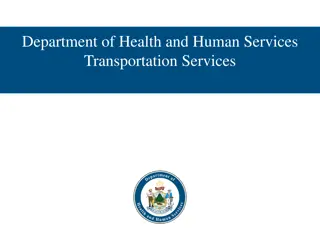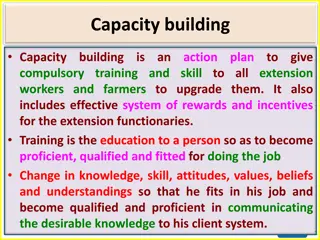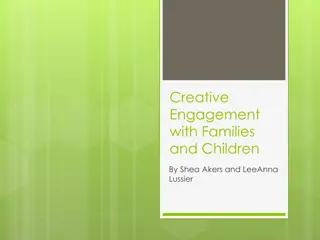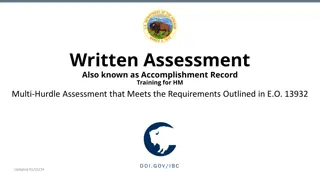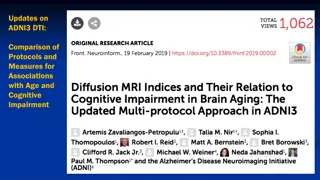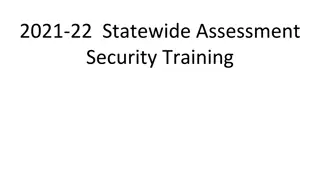Building an Assessment Framework: Processes, Measures, Training
Constructing a comprehensive assessment framework involves establishing goals, developing assessment tools, analyzing results, and addressing challenges. Key principles include enabling assessment over time, holistic curriculum assessment, and engaging faculty in the assessment process. The framework entails CSWE reaffirmation and aligning with EPAS outcomes for program improvement in a large, complex social work program. Faculty training, data collection methods, and the creation of explicit assessment tools are integral components.
Download Presentation

Please find below an Image/Link to download the presentation.
The content on the website is provided AS IS for your information and personal use only. It may not be sold, licensed, or shared on other websites without obtaining consent from the author.If you encounter any issues during the download, it is possible that the publisher has removed the file from their server.
You are allowed to download the files provided on this website for personal or commercial use, subject to the condition that they are used lawfully. All files are the property of their respective owners.
The content on the website is provided AS IS for your information and personal use only. It may not be sold, licensed, or shared on other websites without obtaining consent from the author.
E N D
Presentation Transcript
Building an assessment framework: Processes, measures, training, and challenges Wendy Smith, Ph.D., LCSW Shelley Levin, Ph.D., LCSW Betsy Phillips, Ph.D. LCSW
Assessment 1. Framework Development: Goals: reaffirmation & school 2015 EPAS Outcomes & 5. 5. 5. Program Improvement: Holistic assessment Use of field model 2. Creation and Use of Assessment Tool: Present findings to faculty Competencies & Behaviors Explicit and implicit Specialized practice Curriculum/program changes Mapping across curriculum Changes to assessment framework Training materials & videos for faculty 4. Analysis of Results: 3. Data Collection: independendent contractor Manual data entry SLO Workgroup (representatiive faculty) Electronic data entry
Framework development CSWE reaffirmation and 2015 EPAS School of social work goals: evaluation of new curriculum; program improvement Need for new assessment tool Large, complex program, including virtual program option
Key principles underlying assessment framework Assessment over time. Field assessment instrument should enable assessment over time, from first semester through fourth semester, with expectations for level of competency increasing. Curriculum assessment should be holistic. Faculty assessment of student competency as demonstrated in classroom should be decoupled from exclusive dependence on grades. Faculty should be engaged in assessment process. Faculty members participate in development of framework and instruments, receive training and support to complete assessments, and are involved in discussion of findings and implications for program improvement.
Assessment tool: explicit curriculum Development of specialized competencies & behaviors concentrations and departments Competency mapping process Faculty involvement Development of rubric, based on field model
Faculty training Department meetings Written guidelines Online video In person training/discussion
Data collection Faculty rate behaviors for every student in each class Manual data entry Excel Electronic data entry Salesforce Faculty support during data collection Faculty support during data collection
Analysis of results Independent contractor provides data analysis Student Learning Outcomes Workgroup Standing committee of Curriculum Council Representative faculty lines and departments Discuss findings and implications Implicit curriculum assessment Employer survey Student survey on diversity
2015 EPAS Field Practicum Assessment Semesters 1 and 2 0 1 2 3 4 5 6 7 8 9 10 Sem 1 7 0 1 2 3 4 5 6 8 9 10 Sem 2 Red = Does not meet expectations Green = Meets expectations Blue = Exceeds expectations Competency 2: Examples of Generalist Practice Behaviors 2a. Communicates their understanding of the importance of diversity and differences in shaping life experiences as learners. (Example: The student respects and encourages involvement from family members to develop a case plan that reflects their cultural values.) 2b. Engages clients and constituencies as experts of their own experiences. Constituencies include individuals, families, groups, organizations, and/or communities. (Example: The client has a mental illness. The student respectfully asks her todescribe her experience in the home environment where mental illness is stigmatized.)
2015 EPAS Field Practicum Assessment Specialized Practice Sem 3 0 1 2 3 4 5 6 7 8 9 10 Sem 4 0 1 2 3 4 5 6 7 8 9 10 Red = Does not meet expectations Green = Meets expectations Blue = Exceeds expectations Competency 2: Examples of Specialist Practice Behaviors (Adults and Healthy Aging) 2a. Recognizes and communicates understanding of how diversity and difference shape human experience and identity for adults of all ages when addressing their mental and physical health and well-being. 2b. Consistently applies an intersectional framework with individuals, groups and families that considers multiple factors, including age, class, color, culture, disability and ability, ethnicity, gender, gender identity, immigration status, marital status, political ideology, race, religion/spirituality, sexual orientation, and tribal sovereign status when addressing the mental and physical health of adults of all ages and their families.
Challenges in field assessment Grade inflation Solution: comments required for entries in blue zone Field instructors have difficulty understanding item(s) Solution: Examples provided for each item Training provided to faculty and field instructors on use of assessment tool.
Challenges in curriculum assessment New EPAS New curriculum On ground (local and regional) and virtual (national) programs Existing assessment framework was unsatisfactory Creating specialized competencies simultaneously with creating assessment framework
Program Improvement Presentation of findings to faculty and administration Plans for curriculum, field, and program improvement Modifications to assessment framework for next round.
Contacts for further information Wendy Smith, Associate Dean, Curriculum Planning & Assessment. wsmith@usc.edu Betsy Phillips, Assistant Dean, Faculty Development. betsy.phillips@usc.edu Rona Smith, Assistant Dean, Academic Affairs. ronasmit@usc.edu
